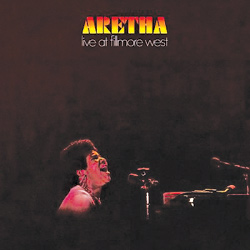Aretha Franklin
Live at Fillmore West
(Atlantic/Rhino)
King Curtis
Live at Fillmore West
(Atco/Rhino)
The confluence of soul royalty and white rockers took place at 1967’s Monterey Pop Festival when Otis Redding, still half a year from recording “Dock of the Bay,” met what he dubbed “the love crowd.” Aretha Franklin’s three nights at the Fillmore in 1971 also made for a storied engagement, one whose lore is often oversold. Announcing herself with a hurried “Respect,” Franklin set about winning over the most famous of hippie venues. Expanding on trips she’d already made to the rock well for the likes of “Eleanor Rigby,” she dug into recent AM history with an OK “Make It With You” (no match for Teddy Pendergrass’ later one) and a “Bridge Over Troubled Water” that’s much more connected with her transformative gifts. (Check her rarely heard “My Way” on this spring’s Atlantic Unearthed: Soul Sisters.) As the response to her hits shows, no one listening had to be introduced to Lady Soul.
The stand’s truest highlight came with a chance bit of music and theater: the appearance of Ray Charles on a lengthy “Spirit in the Dark” that grows even more happily sprawling with the insertion of many minutes cut from the original LP and later CD reissue. This edition’s second disc of bonus material includes an hour of unused tape that reveals Aretha occasionally still pulling her act together with a band she’d used to glorious effect in the studio, but never live. These moments, featuring unheard songs like Jimmy Webb’s “Mixed Up Girl,” are more intimate for their frequent lack of polish and the star’s sweetly conversational audience interplay. Followers might decide their ultimate Fillmore is a hand-chosen one with tracks from both discs.
King Curtis had his own relationship with rock. A master saxophonist, he made his bones with loud, clear solos on Coasters hits before reaching a level of stardom that led to this gig opening for Aretha. Though a master player, he and his ensemble dig deep into silliness, matching Curtis’ own “Memphis Soul Stew” and “Soul Serenade” with hip-Muzaky versions of “Mr. Bojangles” and “A Whiter Shade of Pale.” Neither, needless to say, is up to the level of his Shaft-ready cover of “Whole Lotta Love.” RICKEY WRIGHT
Fingletoad, Strange & Siho
Mazzola
(Shadoks)
Beauregard Ajax
Deaf Pricilla
(Shadoks)
Edip Akbayram
Edip Akbayram
(Shadoks)
“Don’t buy American” is the general rule to follow when you’re interested in purchasing one of these lavishly packaged, limited-edition releases from Shadoks Music (a specialty imprint from Germany that digs up long-lost recordings from ye olde hippie days). That’s because the best in American psychedelia is still in print, as it was internationally popular back in the late ’60s and early ’70s. And anything unknown and good that slipped through the cracks (Kak, United States of America, Tripsicord Music Box, etc.) has long since been reissued, meaning those jams that have gone undiscovered until 2006 are basically scrapings from the bottom of the barrel. Now don’t get me wrong, both Fingletoad, Strange & Siho’s Mazzola and Beauregard Ajax’s Deaf Pricilla contain some decent fuzz freakery, delicate West Coast–inspired folk rock, Woodstock-generation lyricism, and, of course, Beatles-esque harmonies (which often fall flat). Hell, the former—an outfit from Illinois—even dabbled in some totally stoned country rock. But ultimately both groups, whose recordings were never released back in the late ’60s, are far inferior to the Byrds, Buffalo Springfield, Moby Grape, and even the Grass Roots. What Shadoks should have done—instead of producing these exhaustive anthologies—was put out an “all killer, no filler” compilation wherein only the choicest cuts from such groups would be included. Now that would be a superior product—one of which these groups’ respective “legacies” are far more deserving. On the other hand, the same cannot be said of non-American obscuro psych. This stuff wasn’t popular on a global level not because it was cut-rate but simply because it wasn’t American or British. Throughout the ’70s, Turkey’s Edip Akbayram—a homegrown rock star with a thick black mane and an impressive collection of luxuriantly beaded robes—laid down one fierce jam after another, fusing
undulating Turkish folk-dance grooves, Manzarek-inspired organ noodling, and some chunky quasi-Hendrix riffage. Two songs into Shadoks’ well-annotated 24-track anthology titled (easily enough) Edip Akbayram, and your hookah ain’t gonna be packed with just flavored tobacco, as this exotic music is the meeting ground between funky Middle Eastern trance and mind-bending acid rock. So yeah, always buy foreign (unless, of course, you’ve never heard the Jefferson Airplane’s After Bathing at Baxter’s LP). JUSTIN F. FARRAR
Mark Knopfler and Emmylou Harris
All the Roadrunning
(Warner Bros./Nonesuch)
This dream pairing of alt-country’s silver fox and Dire Straits’ virtuoso point man is even better than you think it’s going to be. Essentially Mark Knopfler’s answer to Elvis Costello’s 2004 Delivery Man, All The Roadrunning does that rootsy slice of Americana one better by featuring Emmylou Harris on every track instead of just a handful (and yes, Knopfler’s touring with Harris; just like Spike). Some of Roadrunning‘s brilliance is expected: You knew these two and their spectacularly divergent intonations would sound compelling on ballads like “Beyond My Wildest Dreams,” the title track, and “If This Is Goodbye,” which close out the album in succession like a prolonged lullaby. But it’s watching the duo stretch all over sonic yonder that inches this album toward five-star territory. “This Is Us” and “Right Now” recall blues-rocking Straits’ fare like “The Bug,” and the Harris-penned “Belle Starr” is midtempo bliss. All in all, Roadrunning is an embarrassment of riches with nary a substellar track. MIKE SEELY




